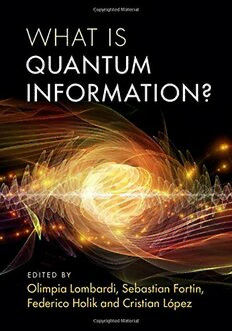
What is Quantum Information? PDF
Preview What is Quantum Information?
WHAT IS QUANTUM INFORMATION? Combining physics and philosophy, this is a uniquely interdisciplinary examina- tion of quantum information science that provides an up-to-date examination of developmentsinthisfield. Theauthorsoffercoherentdefinitionsandtheoriesofinformation,takingclearly defined approaches to considering information in connection with quantum mechanics,probability,andcorrelations.Conceptsaddressedincludeentanglement of quantum states, the relation of quantum correlations to quantum information, and the meaning of the informational approach for the foundations of quantum mechanics.Furthermore,themathematicalconceptofinformationinthecommu- nicationalcontextandthenotionofpragmaticinformationareconsidered. Suitable as both a discussion of the conceptual and philosophical problems of thisfieldandacomprehensivestand-aloneintroduction,thisbookwillbenefitboth experienced and new researchers in quantum information and the philosophy of physics. olimpia lombardi is the director of a research group in the philosophy of physics and the philosophy of chemistry. She has reviewed for several of the most prestigious journals specialized in physics and the philosophy of science, and has been awarded grants from the Foundational Questions Institute and the JohnTempletonFoundation. sebastian fortin is a Fellow Researcher of the National Scientific and Technical Research Council in Argentina, and has spoken and published widely on quantum information theory, the foundations of quantum mechanics, and the foundationsofquantumchemistry. federico holik isaFellowResearcheroftheNationalScientificandTechnical Research Council in Argentina. His research focuses on the foundations of quan- tum mechanics, quantum information theory, the interpretation of quantum prob- abilities, and the study of the logical, algebraic, and geometrical aspects of quantumformalism. cristian lo´pez is a Visiting Fellow of the Münich Center for Mathematical PhilosophyandholdsagraduateresearchfellowshipattheNationalScientificand TechnicalResearchCouncilinArgentina.Hisresearchfocusesonthephilosophy ofphysicsandthephilosophyoftime. WHAT IS QUANTUM INFORMATION? Editedby OLIMPIA LOMBARDI UniversityofBuenosAires,Argentina,NationalCouncilofScientificandTechnicalResearch SEBASTIAN FORTIN UniversityofBuenosAires,Argentina,NationalCouncilofScientificandTechnicalResearch FEDERICO HOLIK NationalUniversityofLaPlata,Argentina,NationalCouncilofScientificandTechnicalResearch CRISTIAN LÓPEZ UniversityofBuenosAires,Argentina,NationalCouncilofScientificandTechnicalResearch UniversityPrintingHouse,CambridgeCB28BS,UnitedKingdom OneLibertyPlaza,20thFloor,NewYork,NY10006,USA 477WilliamstownRoad,PortMelbourne,VIC3207,Australia 4843/24,2ndFloor,AnsariRoad,Daryaganj,Delhi–110002,India 79AnsonRoad,#06–04/06,Singapore079906 CambridgeUniversityPressispartoftheUniversityofCambridge. ItfurtherstheUniversity’smissionbydisseminatingknowledgeinthepursuitof education,learning,andresearchatthehighestinternationallevelsofexcellence. www.cambridge.org Informationonthistitle:www.cambridge.org/9781107142114 DOI:10.1017/9781316494233 ©CambridgeUniversityPress2017 Thispublicationisincopyright.Subjecttostatutoryexception andtotheprovisionsofrelevantcollectivelicensingagreements, noreproductionofanypartmaytakeplacewithoutthewritten permissionofCambridgeUniversityPress. Firstpublished2017 PrintedintheUnitedKingdombyClays,StIvesplc AcataloguerecordforthispublicationisavailablefromtheBritishLibrary. LibraryofCongressCataloging-in-PublicationData Names:Lombardi,Olimpia,editor.|Fortin,Sebastian,1979–editor.|Holik, Federico,editor.|López,Cristian,editor. Title:Whatisquantuminformation?/editedbyOlimpiaLombardi(UniversidaddeBuenosAires, Argentina),SebastianFortin(UniversidaddeBuenosAires,Argentina),FedericoHolik(Universidad NacionaldeLaPlata),CristianLópez(UniversidaddeBuenosAires,Argentina). Description:Cambridge,UnitedKingdom;NewYork,NY:CambridgeUniversityPress,2017.| Includesbibliographicalreferences. Identifiers:LCCN2016057954|ISBN9781107142114|ISBN1107142113 Subjects:LCSH:Physics–Philosophy.|Informationtheory.|Quantumtheory. Classification:LCCQC6.W562017|DDC530.1201/154–dc23 LCrecordavailableathttps://lccn.loc.gov/2016057954 ISBN978-1-107-14211-4Hardback CambridgeUniversityPresshasnoresponsibilityforthepersistenceoraccuracyof URLsforexternalorthird-partyInternetWebsitesreferredtointhispublication anddoesnotguaranteethatanycontentonsuchWebsitesis,orwillremain, accurateorappropriate. Contents ListofContributors pagevii Preface ix Introduction 1 PartI: TheConceptofInformation 7 1 AbouttheConceptofInformation 9 sebastianfortinandolimpialombardi 2 Representation,Interpretation,andTheoriesofInformation 35 armondduwell 3 Information,Communication,andManipulability 53 olimpialombardiandcristianlo´pez PartII: InformationandQuantumMechanics 77 4 QuantumversusClassicalInformation 79 jeffreybub 5 QuantumInformationandLocality 93 dennisdieks 6 PragmaticInformationinQuantumMechanics 113 juanroederer 7 InterpretationsofQuantumTheory:AMapofMadness 138 ada´ncabello PartIII: Probability,Correlations,andInformation 145 8 OntheTensionbetweenOntologyandEpistemologyinQuantum Probabilities 147 amithagar v vi Contents 9 InferentialversusDynamicalConceptionsofPhysics 179 davidwallace 10 ClassicalModelsforQuantumInformation 207 federicoholikandgustavomart´ınbosyk 11 OntheRelativeCharacterofQuantumCorrelations 231 a´ngelluisplastino,guidobellomo,anda´ngelricardoplastino Index 259 Contributors OlimpiaLombardiUniversityofBuenosAires,Argentina,NationalCouncilof ScientificandTechnicalResearch SebastianFortinUniversityofBuenosAires,Argentina,NationalCouncilof ScientificandTechnicalResearch FedericoHolikNationalUniversityofLaPlata,Argentina,NationalCouncilof ScientificandTechnicalResearch CristianLópezUniversityofBuenosAires,Argentina,NationalCouncilof ScientificandTechnicalResearch ArmondDuwellUniversityofMontana,UnitedStatesofAmerica JeffreyBubUniversityofMaryland,UnitedStatesofAmerica DennisDieksUniversityofUtrecht,Netherlands JuanRoedererUniversityofAlaskaFairbanks,UnitedStatesofAmerica AdánCabelloUniversityofSeville,Spain AmitHagarUniversityofIndiana,UnitedStatesofAmerica DavidWallaceUniversityofSouthernCalifornia,UnitedStatesofAmerica GustavoMartínBosykNationalUniversityofLaPlata,Argentina GuidoBellomoNationalUniversityofLaPlata,Argentina ÁngelLuisPlastinoNationalUniversityofLaPlata,Argentina ÁngelRicardoPlastinoNationalUniversityofLaPlata,Argentina vii Preface It is not easy to work on philosophy of physics when living in the southernmost country of South America. Besides the language difficulties and the lack of a tradition on the matter, distance is the main obstacle. Much time and money is necessary to attend the best academic meetings and to visit specialized scholars: everythinghappensintheNorthernHemisphere. For this reason, the Large Grant that we received from the Foundational Questions Institute (FQXi) was a kind of oasis for our academic development. It allowedusnotonlytoattendseveralrelevantconferenceswherewecouldpresent ourworkoninformation,butalsomadeitpossibletoorganizeinBuenosAiresthe international workshop “What Is Quantum Information?” that was the root from whichthepresentbookfinallyemerged.Ourfirstacknowledgement,thus,goesto theFQXi.Butsinceinstitutionsdonotexistwithoutthepeoplewhoembodythem, our acknowledgement is particularly directed to Max Tegmark and Anthony Aguirre,ScientificDirectorandAssociateScientificDirectoroftheFQXi,respec- tively, and to Kavita Rajanna, managing director, and Brendan Foster, scientific programmesconsultant,fortheircontinuedsupportduringtwoyearsofwork. The success of the meeting, nevertheless, was the result of further essential factors.Thefirstofthemwasthefactthatsomeofthemostrenownedinternational specialistsonquantuminformationkindlyacceptedourinvitationtoparticipatein the workshop: Jeffrey Bub, Adán Cabello, Dennis Dieks, Armond Duwell, Christopher Fuchs, Angelo Plastino, Robert Spekkens, and Christopher Timpson. Theirinterestingtalksandthelivelyfinaldiscussionwereaninvaluablecontribu- tiontothereflectionontheconceptofquantuminformation.Ourspecialacknowl- edgementtoallofthem. WealsowanttoheartilyacknowledgeGloriaDubner,DirectoroftheInstitutode Astronomía y Física del Espacio (IAFE), who kindly offered the institute as the venue for the meeting. But the success of the workshop would not be possible without the essential assistance of the members of the Group of Philosophy of ScienceledbyOlimpiaandbasedinthefacultiesofsciencesandofphilosophyof ix
